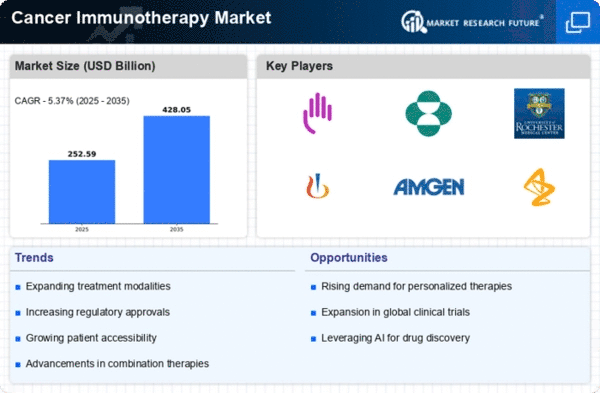Market Share
Global Cancer Immunotherapy Market Share Analysis
It is the rising number of cancer patients and deaths linked to cancer that is driving the global cancer immunotherapy market. In 2020, 10 million people will die from cancer around the world, says the International Agency for Research on Cancer. Around the world, 47% more people will get cancer between 2020 and 2040. 28.4 million people will probably have it by 2040. People are also looking to new cancer medication because normal treatment has problems, such as organ failure and cancer coming back. In addition, the cancer treatment business has grown thanks to better technology and the finding of new medicines. Cancer treatment tells the immune system to go after and kill cells that have cancer. This drug has fewer side effects and longer-lasting treatment effects, which makes cancer immunotherapy more important around the world.
Immune treatments that are brand new and very advanced are likely to help the market grow over the next few years. FDA approved nivolumab, atezolizumab, avelumab, dostarlimab, and other anti-PD-1/L1 antibodies between 2020 and 2022 to treat NSCLC, renal cell carcinoma, melanoma, breast, and prostate cancer, among others. Additionally, more immunotherapeutic drugs are now available, which has assisted its growth. Also, researchers believe that different moves made by market players will make demand rise in the market. Like, BioMed X launched a new study project with Ono Pharmaceutical Co., Ltd. in December 2023. "New Strategies to Engage Neutrophils in Solid Tumors" is the name of the project. Its goal is to make new cancer immunotherapies that use neutrophils' ability to fight cancer.
Some immunotherapies cost a lot, so companies are starting patient access programs to make their products cheaper. It is feasible to cut cancer treatment costs, assist patients get their money back, and negotiate with insurance companies to make it more accessible.
Companies are improving cancer immune therapy using biomarker testing. They use biomarkers to determine immunotherapy success. This allows physicians to provide each patient the finest treatment, which is important for their health.


















Leave a Comment